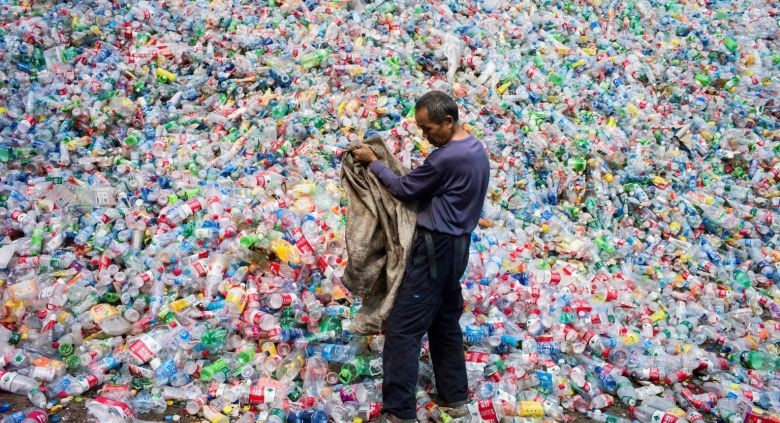China’s waste import ban upends global recycling industry
China’s waste import ban upends global recycling industry
Nations scrambling to find new places for growing piles of recyclables while some Chinese recycling companies have laid off staff or shut down,
BEIJING (AFP) – For years China was the world’s top destination for recyclable trash, but a ban on certain imports has left nations scrambling to find new dumping grounds for growing piles of garbage.
The decision was announced in July and came into force on January 1, giving companies from Europe to the United States barely six months to look for other options, and forcing some to store rubbish in parking lots.
In China, some recycling companies have had to lay off staff or shut down due to the lost business.
The ban bars imports of 24 categories of strong waste, which include sure kinds of plastics, paper and textiles.
“Large amounts of dirty… or even hazardous wastes are combined in the strong waste that can be used as raw materials. This polluted China’s surroundings seriously,” the surroundings ministry defined in a notice to the World Trade Organisation.
In 2015 alone, the Asian large offered 49.6 million tonnes of rubbish, according to the trendy authorities figures.
The European Union exports half of its accumulated and sorted plastics, 85 per cent of which goes to China. Ireland alone exported ninety five per cent of its plastic waste to China in 2016.
That equal year, the US shipped extra than 16 million tonnes of scrap commodities to China well worth more than $5.2 billion.
The ban has been like an “earthquake” for international locations based on China, said Mr Arnaud Brunet, head of the Bureau of International Recycling.
“It has put our industry below stress on account that China is absolutely the biggest market in the world” for recycled materials, he instructed AFP, noting that he anticipated exports of sure materials to tank through forty per cent or more.
Global plastic exports to China could sink from 7.4 million tonnes in 2016 to 1.5 million tonnes in 2018, while paper exports would possibly tumble nearly a quarter, in accordance to Brunet’s estimate.
The reduce will be partly due to a fall in the threshold of impurities China is willing to receive per tonne of waste – greater standards that most countries presently cannot meet.
Some are now searching at rising markets somewhere else such as India, Pakistan or south-east Asia, however it ought to be more expensive than shipping waste to China.
Sending recyclables to China is cheaper because they are placed on ships that would “otherwise be empty” when they return to the Asian usa after delivering client goods in Europe, said Mr Simon Ellin, chief govt of the Britain-based Recycling Association.
Mr Brunet also warned that many alternate international locations may not yet be up to the mission of filling China’s enormous shoes, considering “processing ability would not enhance overnight.” The ban dangers inflicting a “catastrophic” environmental trouble as backlogs of recyclable waste are rather incinerated or dumped in landfills with different refuse.
In the US, collectors of recyclables are already reporting “significant stockpiles” of materials, said Ms Adina Renee Adler, senior director of international relations at the Institute of Scrap Recycling Industries (ISRI).
“Some municipalities have announced that they will both no longer take sure substances or direct them to landfills,” she said.
Mr Brandon Wright, a spokesman for the US National Waste and Recycling Association, informed AFP that some facilities had been storing stock backyard or in parking lots.
The ban has additionally created challenges for Chinese agencies established on overseas waste.
“It will be very hard to do business,” stated Mr Zhang Jinglian, owner of the Huizhou Qinchun plastic recycling business enterprise in southern Guangdong province.
More than half their plastics were imported, and as prices for such uncooked substances go up, manufacturing will be decreased by way of at least a third, he said. He had already let go a dozen employees.
Others, such as Nantong Heju Plastic Recycling in coastal Jiangsu province, will “no longer do business” at all, a representative said.
But at the equal time, the ban ought to jolt China into improving its own patchy recycling systems, allowing it to reuse extra neighborhood materials, said Greenpeace plastics professional Liu Hua.
“In China at the moment, there isn’t a complete, prison and regulated recycling device in place,” he said, with even massive cities like Beijing reliant on unlawful scavengers.
“When there are not sources coming from abroad, there is a greater possibility of us enhancing our own interior recycling.”
In Europe, the ban ought to also have the advantageous impact of prompting countries to center of attention on creating domestic recycling industries, said Mr Jean-Marc Boursier, president of the European Federation of Waste Management and Environmental Services.
“The Chinese selection forces us to ask ourselves whether or not we wouldn’t be interested in making processing flowers in Europe so as to export products as an alternative than waste,” he said.
On Tuesday, the EU unveiled plans to section out single-use plastics such as espresso cups and make all plastic packaging recyclable by 2030



Leave a Reply
Want to join the discussion?Feel free to contribute!